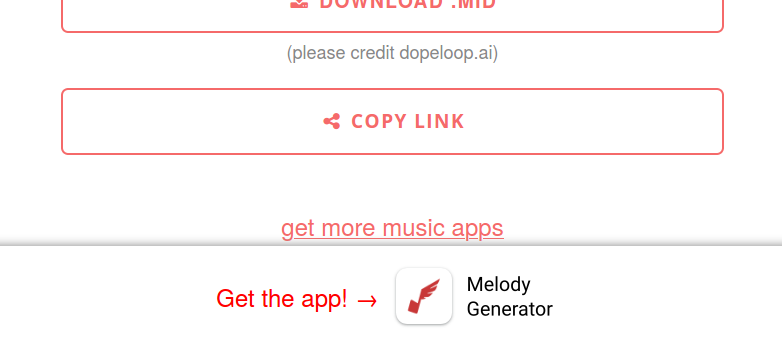Bootstrapping a one-person software business is a long and winding road. I have the luxury of time and resources on this quest but I know others aren't so lucky. I'm interested in uncovering the secret sauce to launching businesses that work. I love open source and I want to open the sauce, pop!
I have three developments to report. Two experiments and one free tool you might find useful. Here goes.
Experiment #1
First off I want to tell you about an experiment which was a raging success! It was a raging success in the sense that I got an experimental result. The result was I was not able to exclude the null hypothesis. In other words it failed completely.
The Dopeloop Melody Generator online app is now receiving about 9k visitors per month. Most of them come from organic search for terms like "melody generator". My hypothesis was simple: some percentage of those 9k visitors will pay for a native version of the app.
It took me a while but I finally managed to get the paid version of the app in the Google Play store last week. I put a banner on the free online app linking to it and a sales page explaining the new features (mainly "download melodies as a wave file"). Then I went to sleep.
Here's what the banner looks like at the bottom of the app:

The next morning I woke up to the first sale. Success! People were clicking through. If I even got one sale per day then this experiment would be worthwhile. It would prove to me that search-engine-to-product-purchase is a reliable channel.
Alas, there was a bug in this first version, and that sale was refunded soon afterwards. I fixed the bug and uploaded a new build.
One week later and there have been zero more sales. According to the stats very few visitors are clicking through from the online app to the paid app. Why? Are the features of the paid app not compelling enough? Are they on a different platform or OS? Are they just disinterested passers by? Now my task is to iterate on this channel and figure out the answers to some of these questions.
Experiment #2
Ok now for an actual success. Not a raging success but a more hopeful data point.
Last year I released a sci-fi roguelike game called Asterogue. The game took me 1.5 months of part time development to make. I marketed it by tweeting development updates, writing blog posts, and launching on a bunch of different sites and forums.
For my first real commercial game it was a moderate success. It had 38 sales on Android and 27 sales of the Windows version and made about $500 AUD. I was pretty happy with this outcome because I was fully expecting a total flop.
Games are generally bursty. All of the sales are made at the start and they drop off rapidly as the novelty factor wears off, and Asterogue was no different. One thing I kept noticing was the Android version was getting a trickle of ongoing users who were giving it five star reviews.
Super clean and streamlined Sci-fi roguelike without all the cryptic baggage. Definitely a hidden gem that I hope gets more exposure.
Despite some rough edges people seem to genuinely enjoy the game. This particular review got me thinking. How could I get more exposure for this game?
What I did was put the game on sale for $0 free free free for one week. I have read about other developers doing this and getting a burst of new users. My hypothesis is this: if I can get a burst of new users and exposure, the game will get a second wind of actual sales once the free period ends.
So far I have one day of data and the results have exceeded my expectations. More than 1000 new users on the first day of the sale. None of my games has ever had this many downloads before. Even ones that I gave away for free from the start.
I guess people really like free stuff. Even moreso, they like stuff that used to be paid and is now free. Zero-dollar sales are a great way to drive traffic to your project.
I don't know yet whether this will mean more people buying the game when the sale is over. Will soon find out.
Oh by the way you can still get the game for free if you want to try it:
A free tool for prioritizing
There are always too many things to do. There are more things on your TODO list than you can do in a lifetime. I used to get all tied up trying to figure out what to focus on. Paralyzed by indecision I'd end up not doing anything at all.
The RICE framework is a method of helping you prioritize. The formula is ( Reach x Impact x Confidence ) / Effort. I made a tool you can find at riceprioritization.com that uses this formula to help you rank your priorities.
You can use it on daily tasks, long term goals, or any other type of time/cost option you're considering. It's completely free and open source. Hope you find it useful, and any feedback is most welcome!

